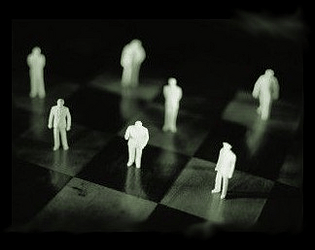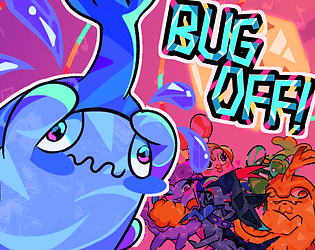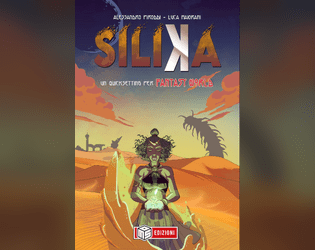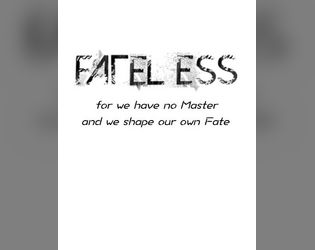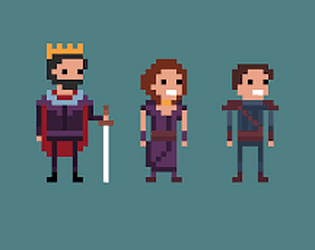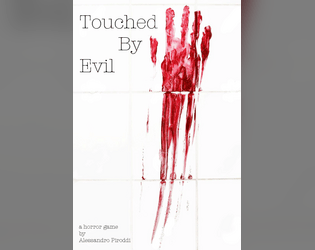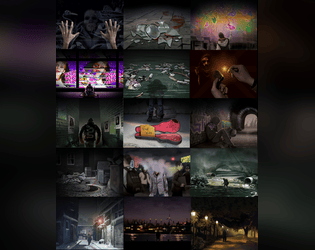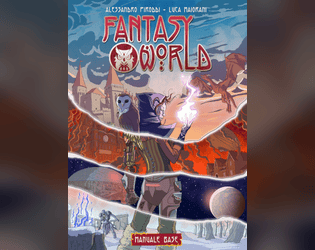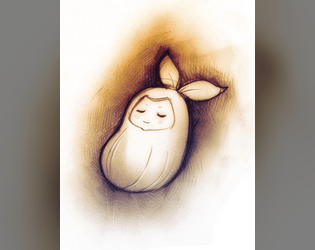Awesome! :D
Alessandro Piroddi
Creator of
Recent community posts
I'm dropping here some interesting link I found / were sent to me.
From Capitalist Realism to Solarpunk Reality. An interesting YouTube conference.
Solarpunk Reference Guide. An aggregation of useful links on Medium.
Solarpunk Manifesto. An Italian resource.
Dear community, I need help finding ideas, inspiration and "visions" to craft a MadMax-like world were #solarpunk solutions took the place of capital, tyranny and neo-liberal egocentrism.
How could one "show not tell" the most striking features of such a society?
What inner groups and factions could clash WITHOUT turning back into accumulation-driven predators?
How could external threats and rival forms of society be depicted without making them into "cool anti-heroes" ?
Community, land me your creativity! 😃
Torque Arena is a tabletop miniatures sport game (MSG fuyioh!) set in a post-collapse solarpunk world. In this setting, Torque is a full contact sport where rival crews of battlers vie for control of a mechanical contraption, the eponymous "torque ball”, in order to "slay" the opponent's Totem.
The core gameplay is now available for public playtest and in search of feedback, while the narrative campaign play and its setting are still in development. If you like it and play it, be sure to drop me a feedback and some pictures of your kitbashed crews :D
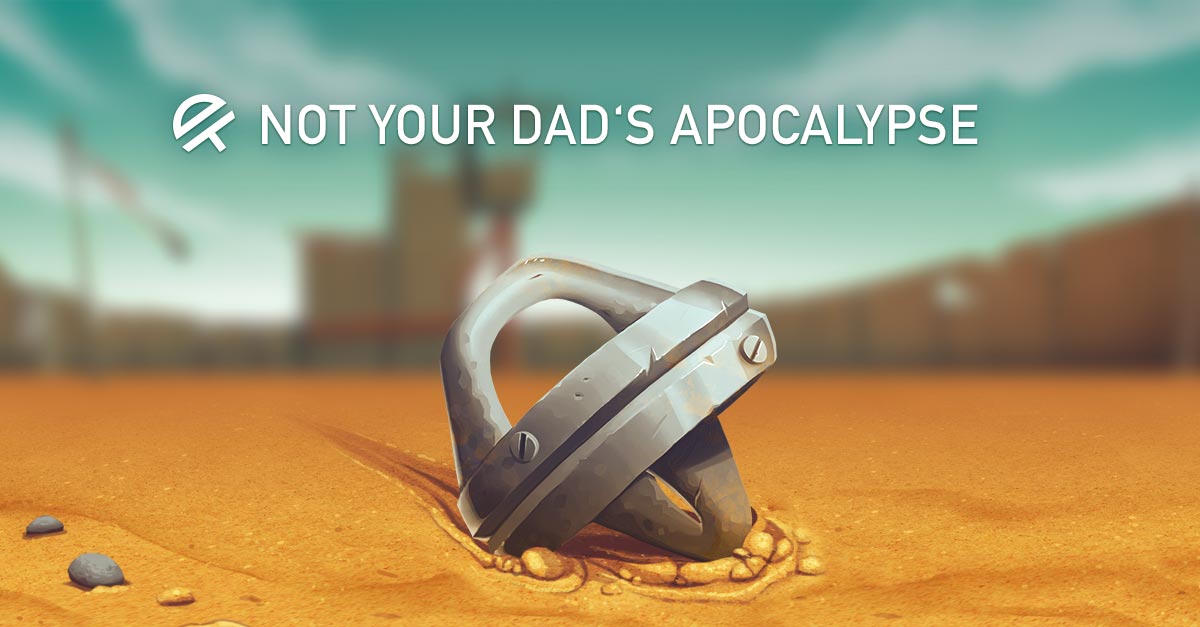
Nope :)
All NPCs have all the Harm options, always.
The difference operates at the moment when an NPC suffers harm.
As the victim, the NPC's player (aka The World) chooses which effects to mark among the ones that are both available and fitting the fictional situation. Just like a PC/Player would.
But while a Player will usually want their PC to survive the longest, suffering the least problems and injuries... the World plays according to a different set of goals and principles. The World doesn't care for the specific NPCs, but for how the NPCs can serve the narrative.
That's why there is what amounts to an easy "KO" effect at all levels, be it Temp or Serious or Deadly. To help the World handle mooks and cannon fodder without bothering with real bookkeeping ;-)
So a goblin COULD go down with a cartoonish hammer-punch to the head... or they could fight direly to the bitter end.
It's one tool for the World to regulate play difficulty and the combat's narrative flow. To highlight important adversaries, and to gloss over unimportant extras. Same goes for handling GROUPS. Which is another tool for the World to easily keep track of just one or two play entities, while describing great numbers of characters.
The difference between a goblin and a dragon is thus 100% fictional positioning.
A relatively proficient swing of a sword could be Deadly to a distracted goblin, or Serious for an alert goblin, or Temp for a goblin that is ready and armed and skilled.
But a dragon? A relatively proficient swing of a sword will never do any amount of Harm to such a building-sized and tank-scaled beast :P
Then again...
Once the PCs come up with a clever plan, and execute it with cool and risky actions, and finally plunge a sword deep in the creature's eye... is the World really going to say "yeah well, it's Deadly harm but the dragon will only die _eventually_" ?
Maybe. Sometimes it might be appropriate.
But some other times it would be much better to have the wyrm die instantly, in an epic and dramatic fashion. It has fulfilled its narrative purpose , it has exhausted its use as a prompt for Players to be clever. Why drag things out? Why sour their victory? Unless there is a good and specific reason for the World to just end the scene, why linger?
Does this answer your questions? :)
EDIT:
In the opposite direction, the World might opt to inflict on their own NPCs effects that are more hurtful than what the PCs intended, to tense a situation and heighten the drama. To show the risks of violence and to kickstart interesting consequences.
"I just wanted to rough him up a bit! I didn't intended to really hurt anyone! How did this go so badly out of hand? T_T"
>:D
Hello Ngoroth :)
Happy to hear you're enjoying the game :D
The design reason is that FW doesn't want to give importance (in terms of time, effort, mental space, etc) to the everyday logistics of "money".
PCs are always assume to have as much "buying power" as the fictional positioning make it reasonable for them to have.
Thus, Players don't track coins.
Moreover, any PC could just start the game being noble, rich, or both, and thus be entitled to have any level of resources and luxury that would make sense. The One Golden Rule to help basic human communication are there to ensure gameplay stays at a level that makes sense and satisfies everyone.
Therefore, the COINS fellowship is never chosen because the PLAYERS (not their Protagonists) want to accrue fictional riches.
That fellowship exists to allow Players to play Protagonists that go forth adventuring as a "profession". Money is one of the main drivers for those characters, but the game is disinterested in engaging with it. It's just a motivator. The real object is immaterial.
Example...
An NPC wants to hire the Coins, but they are too poor to pay "the usual" fee the Coins would ask to a normal client. What do they do?
The game is interested in posing this question, and in seeing what kind of answer the PCs offer.
An NPC wants to hire the Coins, but someone in the fellowship tries to barter for a higher price. "You pay us more or we don't have a deal!"
This can totally happen, and will probably translate into interesting and meaningful reactions from the NPC/World, and probably trigger moves from the PCs, producing engaging play.
How much is "more" ?
Is it a lot or a little?
These questions are immaterial, and can freely answered on the spot:
- We are asking for exactly 75 more Frilly Brilly Tokens, not one less! :P
- Wow, that's a lot for a normal person! But this is a rich merchant, they will sweat but could probably pay without real problems.
More interesting questions would then be... Is it worth insisting on it if the NPC makes problems? Can we then trust them to pay up what was promised? Why even ask for more in the first place? What does this behaviour say about the PCs individually? And as a known fellowship? Do you have a goal for the money you accumulate? Does then adventuring pay well or are you just scraping by? If it's just a normal 9-to-5 job for you, is it worth risking your life for? What about now? And now? Etc...
As you see, actual amounts of money are of very little interest for the core elements of FW. Money might be important for the PCs, and they have it and use it off screen. Instead, for the Players money is just an excuse for adventuring.
That said, nothing prevents you from tracking SOME SORT of monetary resource, or the overall level of luxury and life-style the PCs have. Just use the rules in the Equipment & Supplies chapter :)
The loot from an adventure might be jotted down as a single Tag, affecting the fiction because... it is heavy? cumbersome? is it represented by a single chest or a few bags? is it flashy and hard to conceal? is anyone after it? will it be lost during a particularly problematic and hectic scene? does it make you a target for bandits and thieves? what happens when the PCs meet a poor village in dire need of financial help? what will they do with the treasure they are carrying then? what will the desperate villagers do if they find out that salvation is at hand, but being withheld?
This is the important stuff, in FW :)
Then sure, the loot Tag could also grant Advantage on Restock moves as the PCs spend bits of it... IF the PCs are somewhere they can spend their loot in. Is it gold? What is gold worth in the middle of the desert? Is it ancient books and paintings? What are they worth among savages, or among a civilization that doesn't understand them, or that has grown beyond them?
And of course it could lose worth (just rewrite the Tag accordingly) if the PCs spend too much of it, or it gets damaged by the environment, or in combat. Is it worth holding on to it (and all its implied drawbacks) until the ideal destination to sell it for profit? What if the recipient client makes problems because the loot is not as pristine as they expected? Etc...
Once the loot gets offloaded somewhere safe and somehow converted into resources it might simply turn into normal supplies for everyone, or special unique objects, or why not a special "Supplies" track, separate from the normal one, to specifically represent how much money the PCs have? This works best if you play at a level where that would also GET USED for something... like... hiring henchmen, bribing nobles, maintaining some sort of estate, trying to apply political pressure, running a real business, etc.
If you are really just going to play the classic adventuring party out for the next bag of gold coins, this is better left out, as it adds near-useless elements that will only distract and get in the way of what people really want to do :P
Of course none of this is set in stone :)
Play might start one way, then evolve in some other direction. Maybe for your specific group and campaign, tracking money in more detail makes sense. FW offers you a bunch of tools you can easily scale up and down in detail and complexity.
My personal advice is always to start on the lighter side, relying heavily on pure fiction and nothing more (Tags, Agents, descriptions, fictional positioning). Then try adding small and simple bits of mechanics if/when there is a specific thing you want to be more central to the game you play. The final chapter has a few words of advice on how to hack and modify FW to your needs and desires... you could end up crafting a "harm" system for financial warfare between rival city guilds, or even nations in cold war ;-)
Let me know if these comments are of any help, and if you have any more questions :)
Hi spidamoo, happy 2024 🥳
I’m happy to hear you like my game 🥰
I was under the understanding that the international distributor, Ares Games, provided copies throughout Europe. Have you tried contacting them by email? info@aresgames.eu
You can also try contacting the Italian publisher MS Edizioni. info@msedizioni.it
Or ask your local games stores to do that for you, to carry copies of the game in their stores.
Either way, let me know how it all goes ☺️
I was also thinking... what kind of game are you trying to put together?
If team-driven action and dungeon-mapping are not the core of your ideal experience, maybe a very different solution might work too?
FateLess is more focused on campaigns over one-shots, and individuals over teams.
Touched by Evil and Ikigai both focus on a single protagonist shared by the group of players.
Cerin is a lighweight (and lighthearted) game in between these extremes: team focused, one-shot, and less procedurally strict than L&A.
Then outside the realm of my games there is a vast variety of awesome titles that offer all kinds of gmLess solutions :)
What are you looking for exactly?
I see.
That bit has not changed, but what follows should be a bit clearer...
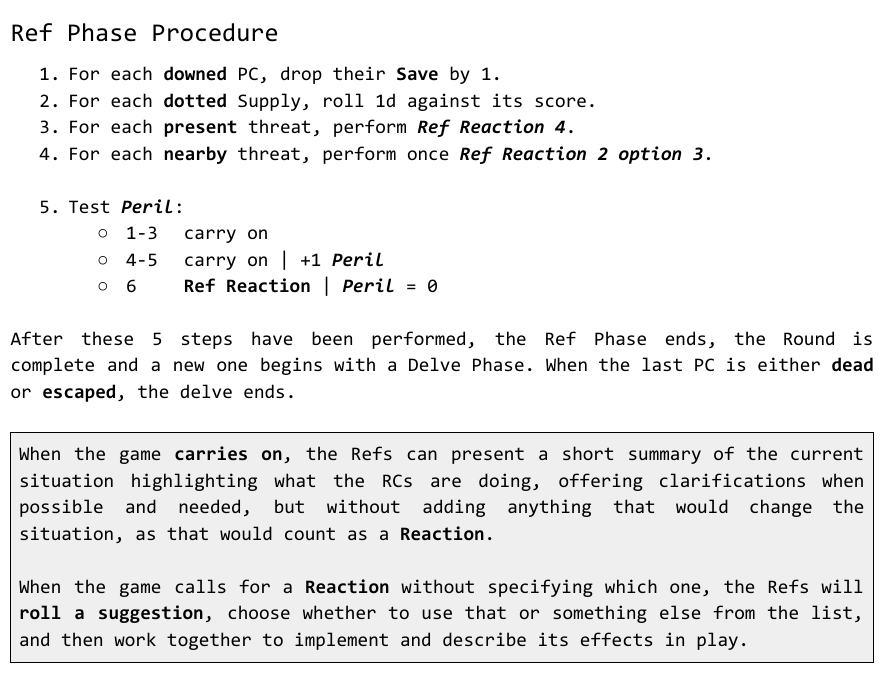
This links back to the general Speaking Order rules. Basically instead of the Ref being the only one doing the Ref job... the Ref is the one with precedence, but then everyone else can have a chance to pitch in ideas and answers. The same happens in the Ref Phase, where the system basically asks questions to the players.
Thus, the Ref job is not a monolithic thing that needs to be passed around. Anyone can join in any time they feel like.
As mentioned somewhere else, having clearly defined roles is mostly for order and clarity. The group always knows WHO is supposed to say WHAT and WHEN. Once that is clear, they can easily behave in a more relaxed way, offering ideas at any time, if/when they feel like. Some groups benefit (or ever require) a more hierarchical order to feel at ease with the game. Some players have problems with (or categorically refuse to) engage with Ref-side activities while they are still also playing as Delvers. For them this structure is beneficial.
For others (maybe your group?) it's more like a vague guideline to follow by feeling ;-)
In the case of this specific game element, as long as your group feels good with it, it's all good. The important bit is avoiding that same person asking a question and offering the answer too. That is usually quite boring and shifts the experience too much towards "shared storytelling" rather than an actual game where you get challenged and surprised.
Hi :D
I appreciate the attempt to be explicit about PbtA moves and expectations. Codifying various dungeon delve bits into Discovery, Navigation, Peril, and Progress scores appears to work to support generation of this specific type of adventure. Clearly categorizing the moves according to the types of actions in the delve is also very helpful.
Thanks 🥰
Keeping track of the various modifiers and subsystems and if/then conditional outcomes is a bit more bookkeeping than my table prefers.
In an ideal world that would all be taken care of by an app. Part of the design of this game is aimed at making it "app friendly" so that Players would not even need to read the rulebook. Just open the app and follow the instructions on screen. In the meantime, this "paper prototype" requires a bit of human-powered maintenance and bookkeeping, that's true 😅
Shared refereeing as written in this game is something I’m very interested in. However, it appears that the Ref falls only to the Leader until such time as another PC escapes or dies. [...] Do you have experience or suggestions for multiple Refs in less lethal games? Have you thought of a mechanic to share the role across the other players?
Actually, yes :)
The currently online version is from April 2023, but the latest WIP document is from September 2023. I made a bunch of changes and tried to playtest them befor publishing an update... but time and IRL issues delayed that quite a bit. I'll try to get around to upload the new files as soon as possible.
One change that might interest you is to the Lead role. Before, as you noticed, the Lead was the Ref until a full-time Ref emerged.
Now instead the Lead actually leads the Ref procedures as a sort of moderator, meaning that everyone else gets to participate if they want, with the Lead managing and prompting the conversation and then, is needed or wanted, pitching in last. Here are the relevant bits...

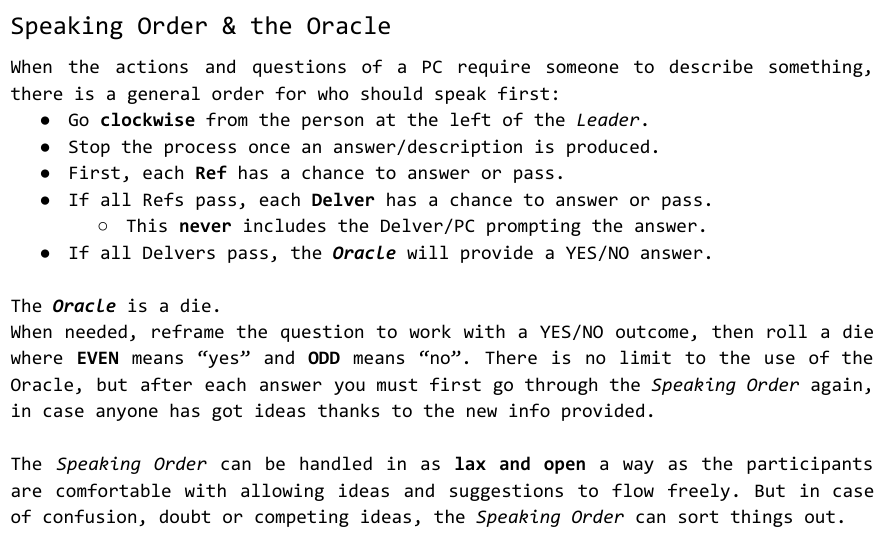
This system ideally avoids the Lead being the sole Ref of the game, and helps everyone being more included and partecipative... if they want to, when they want to. In addition to this, the Ref Phase itself has become more structured than before, hopefully easier and clearer to handle :)
I hope this helps with your question! 😀
Hi Bill :)
Sorry for the late reply, but during the weekend I was away, attending a game fair in the city of Essen, Germany.
Fantasy World RPG is free to read and play through a dedicated wiki-rulebook, here. This is why the game is "pay what you want". It is merely a tip-jar for people that feel like saying thanks.
What you have downloaded, the lavishly illustrated PDF chapter, is a preview of the commercial book published and sold my MS Edizioni.
You can get the PDF from DriveThruRPGs or the printed book from Ares Games either through their online shop or by asking your local store to get a copy from them.
The two versions (free wiki and commercial PDF) present exactly the same text, complete in its every part. The main difference is that the PDFs have a much nicer layout, a lavish set of more than 60 original illustrations, and most people find a PDF more usable than a wiki :P
I'm sorry for the confusion. I'll try to make this all clearer in the project page here on itch.
And if you have any questions or problems, please don't hesitate to contact me here :)
Grazie del link, adesso me lo guardo bene :)
Sul premio al "più" qualcosa... si. È un'intenzionale introduzione di un elemento competitivo. Una competizione minima e amichevole, ma pur sempre una competizione. Puoi compararlo a una FanMail, un metodo che richiede ai partecipanti al gioco di valutare il contributo degli altri, e in ritorno di essere valutati allo stesso modo. È un elemento periferico ed extra che, nello specifico contesto di questo gioco, ritengo possa avere un effetto positivo (ma capisco se la tua mente va verso altri giochi in cui un simile elemento crea tossicità al tavolo).
Sarei molto curioso di sapere come funziona al tuo tavolo, se mai avrai modo di provare una partita :)
Vediamo…
Per farla semplice, le parole possono assumere diversi significati in base al contesto e all’uso. La tua definizione di “punk” è certo valida, ma non è l’unica esistente (non mi metto a citare vocabolari e altre fonti).
Nel contesto del manifesto parlo di generi narrativi, e in quell’ambito ho cercato di individuare ed esplicitare l’elemento comune in tutti i qualcosa-punk che conosco.
Alcuni presentano il tema della “ribellione contro un sistema oppressivo” o per lo meno la “rottura violenta con uno status quo”… ma…
- Laddove possiamo concordare che il genere cyberpunk comprenda il tema della ribellione sociale… non tutte le opere etichettate come cyberpunk contengono quella tematica. Esiste tantissimo materiale “cyberpunk” il cui focus è l’estetica retro-futurista immaginata negli anno 80 a base di neon e cromo, spinotti e cavi, crimine organizzato e rockstar.
- Vari qua qualcosa-punk esistenti non hanno alcuna traccia del tema della ribellione sociale. Tipo lo steampunk, il dieselpunk, il rivetpunk, il cottage punk, etc etc etc.
Sono generi narrativi. Comprendono tanti elementi. Quello che tu individui è solo uno fra tanti, eppure tutti sono identificati come qualcosa-punk. Io mi limito a notare questo fatto, e a definite il concetto di Grognardpunk in base ad esso.
Poi oh, se vogliamo scavare a fondo si può facilmente inquadrare il Grognardpunk come rottura di uno status quo ;)
Ma è tutt’altra tematica.
- - - - - -
[quote]
Un altro dubbio, che viene […] dal manuale, riguarda i PX.
Mi sembra che premiare cose come:
"vote who seemed to answer the most questions" possa promuovere l'idea del "bravo giocatore".
[/quote]
Corretto.
Il gioco premia, in modo chiaro ma gentile, i comportamenti al tavolo che permettono al gioco di funzionare bene.
Chiaro, perchè elenca esplicitamente una lista breve (3 elementi) di comportamenti pratici.
Gentile, perchè lascia ai Giocatori stessi il giudizio, e perchè l’impatto di questo giudizio è desiderabile e gradevole ma minimo.
Ma ho l’impressione che questo per te sia un male? 😅
Ciao 🙂
> sono sorte DIVERSE perplessità, ma tipo tantissime
LoL 🤣
Il paragrafo sul "punk" si trova nel manifesto Grognardpunk, che non è il manuale di gioco, ma un documento che esprime le idee alla base di un certo modo di fare game-design. Il regolamento di gioco è nel file 20221117_TPK_Rules_tes.
Questo già potrebbe spiegare alcune perplessità 😅
Parlando invece del termine "punk"... io mi limito a prendere atto dell'uso corrente e funzionale. Ma mi interesserebbe vedere l'intervista di Iacopo. Se ritrovi il link me la potresti postare qui? 🙂
E tu, cosa pensi che significhi "punk"? E perchè sarebbe lontano dalla definizione offerta nel manifesto?
I don't see FW as materialist.
There are no gods in the religious sense... like... a magical person that KNOWS what's right and wrong always for everything and thus justifies any behaviour if enacted in its name.
But... there ARE spirits and magic and metaphysical entities. Matter can be a by-product of mind and spirit. No problem :)
What is true though, is that I strongly feel that morality is relative, and I worked really hard in the design to make it so Players and World can't misunderstand it.
Characters can believe in absolute good and evil, and the game never tells them they are wrong... but it TESTS this belief, it makes them question it. They they surely can answer "Yes, that's exactly what I believe" at every turn. But the question was posed and played through. Repeatedly explored to discover its limits.
This. It never occurred to me that this could be a relevant thing to mention in describing the kind of fantasy stories the game supports ^_^'
I'll have to ponder on this point. It's very interesting :D
Interesting, thanks for the links :D
And (again) thanks for the typo notations and the feedback in general, it's all very useful :)
About FW genre as compared to Romantic Fantasy...
TL:DR
- Romantic Fantasy is the bread and butter of FW, just use a more PG-13 tone and you are good to go.
- High Fantasy is... less fitting, depending on which tropes and elements you focus on. Pretty much everything is doable and fitting except for 2 things: plot-wise the focus on the lone hero, theme-wise the focus on Good-vs-Evil
...
So, Romantic Fantasy?
- strong female lead... can do
- themes of tolerance and diversity... can do
- themes of ecology and environmental care... can do
- themes of "nature vs tech" and "responsible use vs abuse"... can do
(basically Saruman's factories vs nature and natural magic) - exclusive to humans and "bright" animals... can do
- no problem on the kind of Protagonists involved, the focus on their evolving inter-relationships
- no problem on the social change they can bring
- the focus on the ties between Protagonists and the world surrounding them (socially, politically, relationally) is at the core of FW too
This far I see zero differences between Romantic Fantasy as defined by Wikipedia and the Blue Rose article, and what can be achieved with FW. It actually fits very well and is supported and encouraged but the system mechanics :)
The one big difference I can see is the whole "good vs evil" thing.
It's possible to do... but for the Protagonists (thus the Players) it doesn't come free, nor easy.
What I mean is...
In D&D a Legal-Good character is "good" by definition, no matter what they do. The game never challenges the PC's (or Player's) definition of what "good" means. It is sanctioned by design. This of course goes in pair with the idea that "good" exists in the first place, and thus that also "evil" exists in and of itself, and (usually) that these are not circumstantial elements but rather intrinsic qualities.
Players and GM have to reeeally want to question and explore different moral themes in their game, and work hard at doing so with their own out-of-game devices.
In FW it's the other way around, especially if classes such as the Priest and Knight are involved in the mix. The game mechanics never impose an "all is grey, all is relative" worldview... but... they often foster the idea that, literally, "everything is people". So while there can easily be an "evil tyrant" it also comes natural to see them as a person, with their own flaws and qualities, fears and hopes, a past, a family, things they love, etc. This doesn't excuse their "evil acts" but it puts them into a frame where you can at least understand them, see them not as "evil" but rather misguided, broken, corrupted ... all qualities that are situational and could happen to anyone.
The "monster" in the cave? It's a savage beast, sure, and dangerous, sure, and needs to be dealt with, obviously... but it's not intrinsically "evil"... it's a "person" too... it's behaviour comes from somewhere, it has its own reasons, it can be understood.
All of this is presented, through many bits of the game mechanics, as a sort of question to the Protagonists (and their Players).
You are "good"? Fine, but why? What does it mean? What if the villain does the same thing you do? Are they "good" too now? No? Ok, but why? What's the difference? Ah, this is the difference? Fine, perfect, does it still holds true under this other circumstance? And this one? And this one?
They are "evil"? Fine, but why? etc...
There is no right answer, so the game never pushes a specific view. But the questioning is "softly ingrained" within the mechanics. It can be downplayed without breaking the game. But it's there.
I have to admit, I don't see the difference you seem to find so relevant.
And maybe part of the problem is due to your initial expectations and hopes about how to play the Priest (does God exists or not?) and your specifically "theist" way of intending religion.
Let's see if I can reframe the Priest for you :)
1) Player knowledge
When the player feels like having the Priest believe in god, that's a good day for the PC, their faith is strong and steady.
When the player feels like having the Priest not believe in god, that's a hard day for the PC, their faith is shaken and unsteady.
See? Free choice. Either way you can easily switch back and forth.
I mean, you could also play the Priest "upside down" :D
he PC might not believe in their deity. Maybe they never did, as they were indoctrinated but never truly bought in into the spiel. And then the player chooses to notice how a crop of flowers looks like a sign. And how the PC looks at a star constellation and feels an omen. Or how the words of a stranger resound full of meaning, although it probably is just a coincidence.
Maybe the Player starts the campaign choosing to apply their knowledge to the Priest, and later on develops the character is such a way that they will choose to NOT apply their knowledge, having the character "believe again" :D
And you said it yourself: the language of the moves is suggestive. Nothing else. You can then take what you want from it :)
The priest doesn't believe in their deity? Fine, but the ritual prayers STILL feature the deity's name, obviously. How does the Priest feel about that? Is it a bitter joke? Is it a comforting tradition? Is it puzzling and conflicting?
2) The core question
I don't know... maybe it's because I look at it from a different angle in general? Like... I don't care whether the deity exists or not. Not being able to EVER know makes the question uninteresting and irrelevant to me. Thus my focus shifts on to the religion itself: the preachings, the dogmas, the tenants, the values, the rituals, the traditions, etc...
The question is: do I believe that my religion is valid? are my inner feelings and beliefs aligned with my religion? are there pain points in my adherence to the religion? do I shape it, or does it shape me? and what about the rest of the world... how do they relate to my religion, and to me as one of its representatives?
THIS is the question at the core of the Priest.
I understand that it's a different question than what you initially expected. Sorry to disappoint ^_^
3) Ungodly Gods
One very interesting way in which I saw the Priest played a bunch of times is to simply sidestep the whole "guy in the sky" question at the diegetic level. Like... instead of a positive religion, why not play a philosophy?
Gods don't exist, but what if your religion is instead about "the universal balance"?
Game mechanics say that there is no "guy in the sky" but say nothing about... I don't know... Karma... or reality being a computer simulation... or kale being good for you... or being vegan.
There can be a religion based on ANY such things, and the Priest can believe them or not as they are, in game terms, an open question.
I had a campaign set is a sort of "mythological greece but in spaaace" where the Priest believed in "the golden triangle" ... a fundamental principle of geometric harmony. It was very believable, it played perfectly, it even sparked many scenes (often Bond scenes during a Long Rest move) where the Protagonists would discuss, debate, enquire about his religion :D
-
So unless they only draw of the Priest was the "is god real or not?" question, then my suggestion would be to try, as a fun experiment, to play a Priest and see what happens :)
I personally would be very curious to know how the experience goes for you :D
When I think of “fantasy,” I realized I’m almost always thinking of “romantic fantasy.” FW does not seem like it will play out romantic fantasy well.
That's very interesting to me... could you elaborate? :D
What do you mean by "romantic fantasy" and why do you feel that FW doesn't do that well?
Wikipedia offers some info, but I want to be sure about your specific point of view.
(also at this point I have a question for background: have you played FW already?)
We might chat about religion :)
But maybe in a separate post ^_^'
As for the rest...
Do you remember what went wrong with it? I’ve been trying to think of ways this could not work as intended, and I can’t think of any. I’m really curious.
Simply put... the game ended up being played like D&D with the Cleric/Paladin.
That is to say:
On the Player side, the fact that a deity existed was plenty of justification for any and all actions the PC undertook. No moral dilemmas, no doubts, no questions asked. They are on the deity's side, so they are on the "right" side, no matter WHAT they do or HOW they do it or WHY they do it. This made most Priest moves fall flat.
On the World side, sooner or later there would ALWAYS be a moment when a deity would just manifest itself in obvious ways.
It's the most simpler and most effortless answer to a PC that behaves in that direction and actively seeks/plays omens and signs.
GMs that tried to not do this reported a LOT of fatigue and difficulty in reminding themselves to constantly second guess everything they did (it has to look like it could be a divine sign, but it might not be, but maybe it is...)
Also... the aforementioned Player behaviour led many Worlds to feel as if they should, like in D&D, pass judgement on the Priest's behavior, to check that they don't abuse their divine power. But this is NOT what the World in FW should do, nor they have the tools to do it. So there was a lot of frustration all around.
Instead with the new and clear state of things (there are no deities, period) everything works much better.
Priest move are effective in helping the Player express their personal version of faith and morality and religiousness, while at the same time confronting them with it without any alibi or finger to hide behind.
The World doesn't have to keep track of "meta levels" and can much more easily and effortlessly come up with what they need to. Nor do they feel the need to keep the Priest in check, and can instead LEAN ON anything the Priest does with the normal tools that FW offers.
It was a night and day change. And for the better :)
-
If the players know something at my table, the characters know it too, or at least are allowed to know.
That's how things work in FW too!
There is a TON of metagame going around, and it is a good thing that everyone is encouraged to embrace and leverage for the betterment of everyone's enjoyment of the game :)
What the Angry GM is addressing are a lot of connected things... but that ultimately have little to do with playing the Priest as written. He also talks from the perspective of completely different kind of games. Some things he says I completely agree with. Other things make my skin crawl with cringe. One good thing that I see as shareable is this:
YOU are always a part of the equation. You’re not BEING a character. You’re attempting to make choices for a character based on your understanding of their motivations and the world and the consequences. Everything you choose for your character is warped through the lens of your own perception, your own understanding, your own experiences, your own biases. And, a lot of the time, you’re guessing. You’re guessing what it would be like to be this completely different person in completely different circumstances in a world that doesn’t exist.
The error many people do, and that he correctly calls out, is to think that:
- you are you
- the PC is the PC
THIS is the illusion. What in truth happens is:
- you are you
- the PC does not exist, the PC is also you playing pretend
So when a Player behaves like an a-hole and excuses themselves "because my PC would do it"... that's no excuse.
You are describing a thing, and you know that describing that thing would ruin your friend(s) fun. This is what exists, and nothing else:
- either you describe a thing, even though you know that you are being an a-hole for doing so
- or you describe a different thing, because you know this will be better for your friends at the table
But then this applies to EVERYTHING in the game.
You are not a woman, but can play a PC that is a woman.
You are not an elf, but can play a PC that is an elf.
You are not old, but can play a PC that is a thousand years old.
You are not a criminal, but can play a PC that is an outlaw.
You are not strong, but can play a PC that had great physical prowess.
You are not violent, but can play a PC that fights and kills.
You know that in the game there is no "god", but can play a PC that believes in some god.
Heck, this knowledge is what makes it so interesting to play the Priest in the first place!
Like knowing as a Player that your PC has no chance of getting romantic with a certain NPC, but choosing to have your PC try anyway BECAUSE you know that watching them try will make for an interesting story, regardless of the outcome. It's a matter of drama and good storytelling, it's about facing challenges not because we care about the win/lose outcome, but because facing the challenge in and of itself means something for our story.
How about all the times when you know something, and the PC could know it too, but you choose to portray the PC as ignorant because it would lead to more fun play?
It's about playing to find out what happens next, in a way :)
If a Player is interested in playing a PC that believes in a god (and the whole religious system of dogmas and values that come packed with it)... and then, knowing that in the game there are no gods, can't help but portray a Priest that feels cynical about their own religion... well then so be it! It's an awesome dramatic character! :D
How are they facing this crisis?
Do they feel lighter and more free to forge their own path?
Or do they feel abandoned and aimless?
How is it influencing their choices?
How are they affected by a world that instead blindly believes in the god they are doubting?
What will they do when confronted with "true believers"?
Or when someone else will go ask them for comfort, or theological guidance, or counsel... what will they do?
What could restore their faith in their deity?
Or lift up their spirit, to find new energy and purpose in life?
Or what could become a new focus of worship?
How does the Player feel playing this? Is it somehow a reflection of something they recognise? Or do they feel complete distance and separation? Does play suggest interesting questions? Or gives them a chance to try out for size different answers?
THIS is why you play the Priest in FW.
(or any other Class, for that matters)
...when you play FW maybe try first playing it as written. That is... with the assumption that when a Player knows something, they can use that knowledge however feels best to enjoy the game more ;-)
You won't find this specific sentence anywhere in the rules, but I'm positive that there are plenty of sections where this concept is expressed, one way or another, and that the sum total of the game mechanics support and reinforce this approach.
1) on FW "emulation" goals
2) on the relevance of "sex" in FW and the mentioned fantasy novels
-
1)
I'm glad that the list could help you :)
But as I mentioned... FW is really not trying to "emulate" a specific source. Rather, I was dissatisfied with the usual brand of emotionally immature and superficial fantasy adventuring games that were almost exclusively focused on escapism and power trips. I wanted something more humane and multi-faceted, that could also be "fantasy".
So FW does not take inspiration from specific sources, but rather from "fantasy literature in general". More on this can be read in a post I made a while ago on The Gauntlet forum, here.
There I also talk about playing LotR by way of FW.
I am not familiar with Redwall specifically, but maybe you might like the (partial) actual play of the Assassin's Cheese game I played with a group of friends :D
Howl's Moving Castle would be a perfect source of inspiration:
- Howl has powerful magics but deep personal problems. Through the story he evolves from a hurt and spoiled brat, to a healthier and more complete adult.
- Sophie is a common girl with big dreams but little confidence, with serious self-image problems. Through the story she grows a lot, overcoming her fears and doubts.
- Other characters would probably be more NPC material, as they don't seem to have equivalent agency and depth and arcs... but they are ALL presented as "people" and as such they are never throw-away characters, they never feel expendable. From Calcifer impersonating the whole castle, to the Scarecrow, the weird dog, the young apprentice... even "the villain" Witch is made human and somewhat understandable and relatable, even endearing.
- And the story is about how war negatively affects people and the things they love and care about. It's perfect FW material! One could use FW to play something different, but similar enough in all the ways that matter :)
-
2)
I think we might be experiencing a couple of communicative disconnects. Let's see if I manage to express myself in a way that makes sense :)
Also... everything I'm about to write is just me trying to clarify what I understood of your messages, and replying to that.
I don't want to put words in your mouth that are not yours. Feel free to correct any part I might have misunderstood ^_^'
Reading your previous posts I got the impression (and maybe I am wrong) that in your eyes merely mentioning the existence of sexuality in a story is a big deal for that story.
If we read a story, and the page says something like "...we could hear them having sex in the other room..." it is a big deal.
If we play FW and thanks to a move a player says "...as my PC speaks, some people in the audience get closer together, holding hands or passing an arm around each other, sharing eloquent looks..." it is a big deal.
I think that there might be a disconnect in this. In how we define what is and what is not a big deal for a story (and a game that produces stories).
To me, sex is NOT a big deal, because it is such a fundamental element of the human experience (and thus the stories we tell about it) that I barely notice it, and it would require specific focus and intention to make it into a big deal, to highlight it as one of the main thematic elements of a story/game.
So I read your posts and I hear "it's a big deal". And in my mind "a big deal" means that sex is central to the gameplay and the stories it creates. In my experience this might look like Apocalypse World, where how a PC experiences their intimacy with others is one of the main themes of the game. Or like Monsterhearts, where discovering your PC's sexuality and relation to gender norms is one of the core focuses of the game. Or like the dumpster fire that was Charm, where the teenage-bait advertisement was all about "this game has sex in it!". Or the bizarre D&D Book of Erotic Fantasy, featuring uninspiring and tactless rules to measure a PC's sexual stamina :P
(2 amazingly positive examples, 2 embarrassingly negative ones, for balance sake)
And to this I say no... FW world is not like that. FW is not about sex. So it's also It's not a big deal ;-)
And I say the same thing about the novels I mentioned before. Sex is not the main focus, so it's not a big deal.
But while writing this I notice how, if one changes perspective, it IS a big deal XD
FW is about people. People relations are largely driven by sex. To me it's invisible, but the moment you try to purge this element from the game... then it becomes a big deal.
And here there might be a second disconnect.
When I talk about "sex" I mean anything "sexual" or that obviously implies it. For example I easily spot sexual content in Howl's story :)
The character of the Witch is portrayed as being obviously lustful for Howl, both for the power he holds, and for his young pretty face. And after she is cursed, a good part of the "fun" of the situation and character specifically comes from the obvious cringe of an old woman hitting on a young man.
Sophie herself deals with more than one sexually charged situation, as she struggles with her feelings of being undesirable. It's a CORE element of that character :)
And the soldiers and young women from the various cities in conflict are often shown as quite obviously being sexually active, and in sexual pursuit of each other.
If you tell me that there is no sex in Howl's story, I say "no, there is".
But because it's not graphic and explicit you say "no, there isn't".
So when in FW you notice something that could potentially lead to an explicit description, and in itself uses explicit words such as "lust" and "fuking", for you it already is a big deal... and you express it... and I react to it using my parameters for what a big deal is to me... and I say that it's irrelevant... and you say "no, it is relevant"... etc ^_^
Interesting analysis... let me know if I have completely misunderstood you and have gone on an hallucinated tangent trip XD
Anyway, this distinction is relevant to me because of what it means.
If sex is not a big deal in FW, then you can ignore it and use the game to play the kind of sex-less stories you want.
If sex is a big deal in FW, then you can't ignore it and you won't be able to play the kind of sex-less stories you want.
To this I can say:
- FW is, among other things, about people and their relationships and their emotions
- FW is not about graphic and explicit depictions of sexual intercourse
If you are OK with the first point, then I think your group can safely use FW to play any kind of fantasy story they want, no problem.
If you need for graphic sexuality to not be depicted in the game... they can effortlessly do it.
If you need to purge any possible reference to sex from the play content... it's also doable and 100% up to the players.
If you need to purge any possible reference to sex from the game text... that's harder, but doable as there is no pervasive use of such language. But here and there it is present. So you'll have to do some redacting on your side :)
For me, it would be fine for the rules to say, “There will never be any evidence that the gods exist, and there will never be any evidence that the gods don’t exist. Whether or not they exist cannot be known in this game.”
Initially it was like this. It got changed because it simply did not work as intended. On the contrary, the current system reliably produces the desired effect.
I need the Protagonists, and especially the Priest (and in its own way the Knight), to have no alibi for their actions. What you do is your choice, your responsibility. The character may believe otherwise. But the Player has to know this without a doubt.
Again, the Priest's conflict is NOT about the alleged presence of a deity.
It's about conscience and the very personal meaning that religion can have for the Priest.
(and this will emerge through active play whether the Player understands this or not, if they engage with the Class moves)
I mean, WHAT IF there was no judeo-christian-islamic God? Would the whole religion be invalid? Its teachings and morality devoid of value and meaning?
The existence of God has always been a false problem. The true questions is: do you believe that the rules and doctrines you follow are good and just in and of themselves? Are they making the world a better place EVEN IF by chance there is no Heaven and Hell?
THIS is the conflict at the core of the Priest. And "knowing" that in the game world there are with certainty no deities is key to make it all work. If anything, it enhances the (very faintly simulated) experience of "having faith" in something.
If this is not some Player's cup of tea, that's certainly fine :)
The immediate but largely irrelevant answer to your question is... plenty of fantasy novels feature sex. Most of them, I might add.
There is explicit sex in Perdido Street Station, by China Mieville.
And in many books from The Magicians series, by Lev Grossman.
And in some passages of The Kingkiller Chronicle, by Patrick Rothfuss.
And pretty much everywhere in A Song of Fire and Ice, by George Martin.
And here and there in many Cosmere novels, by Brandon Sanderson (I remember at least some in the Mistborn saga, both era 1 and era 2)
There is definitely sex, and quite explicitly so, in the Rivers of London series (by Ben Aaronovitch) and in the Dresden Files series (by Jim Butcher).
There are a few explicit sex scenes in the Broken Earth series, by N. K. Jemisin.
Oh, and there is TONS of sex and actual general debauchery in Elric of Melniboné, by Michael Moorcook.
I hear there is also sex in the classic Conan stories, but I haven't read those, only saw the cheesy (but amazing) movies :P
And oh my gold the sex in The Witcher series, by Andrzej Sapkowski!
And I could go on and on...
Sex was also very much present, albeit never explicitly described, in many classic Forgotten Realms novels by R. A. Salvatore... at least the one involving Drizzt Do'Urden and the Drow underdark society.
There is sexual innuendo pretty much everywhere in the Discworld novels, by Terry Pratchett :D
Etc...
So yeah, if you ask me, there is sex in a LOT of fantasy stories :)
-
That said... this matters little for Fantasy World.
To use technical jargon: Fantasy World fosters a narrativist agenda, rather than a simulationist one.
In plainer words: it fosters the kind of fantasy stories that the participants create for themselves, rather than celebrating a specific work or genre by closely adhering to it.
Fantasy World structure is meant to produce dramatic stories where the protagonists are people. It supports this narrative goal by conjuring (through the rules) emergent character arcs and storylines focused on the protagonists Problems and Doubts, and their common goals and hopes and fears... and usually by challenging all of these with the external world surrounding them: the people living in it, those people's own dreams and fears and goals and flaws and virtues.
Stories that revolve around people tend to also revolve around people's relationships with other people. Which often means sex: love, desire, lust, romance, rejection, heartache, hope, etc... all the good stuff. Kingdoms rise and fall for this stuff. Just think about the epic fantasy that was Homer's Iliad :P
That said... while FW is deeply rooted into people... the game is not, in and of itself, focused on "sex".
There are no "sex moves" like in Apocalypse World, for example.
And the only references to sex in the whole book are to be found in the 2 moves you noticed... and they are there because, well, because they represent (like all moves) narrative clichès and stereotypes :P
One allows the PC to use magic and performance art to crank an audience emotions overboard: sex is the most obvious, natural, and expected outcome. The other does exactly the same, but through the use of rhetorics and passion and fervor.
That said, the mere mention of the possibility for sexual content doesn't mean that it has to be present or central at your table. Or that you have to be graphic in expressing it. It's in the moves to remind the Players that the narrative option exists, then trusts them to do whatever they feel like with it.


